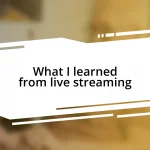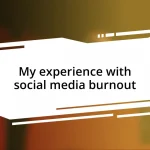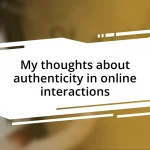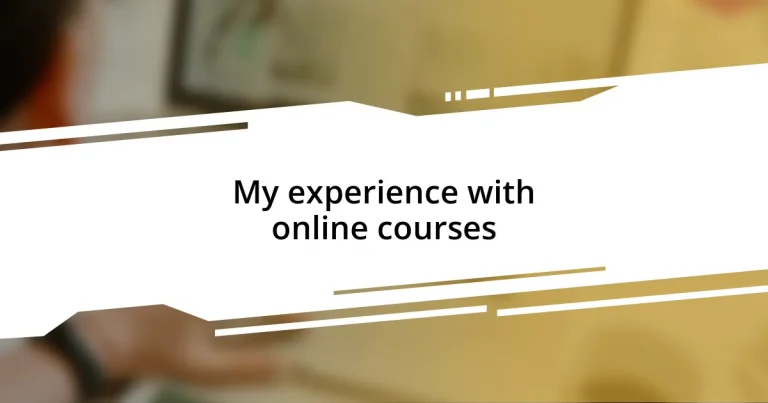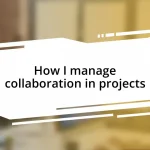Key takeaways:
- Developed a structured routine and study zone, fostering independence in online learning.
- Identified key factors for selecting courses, such as reputation, curriculum, and instructor expertise.
- Implemented time management techniques like the Pomodoro Technique to balance commitments effectively.
- Engaged actively with course materials and peers, enhancing understanding and building a supportive learning community.
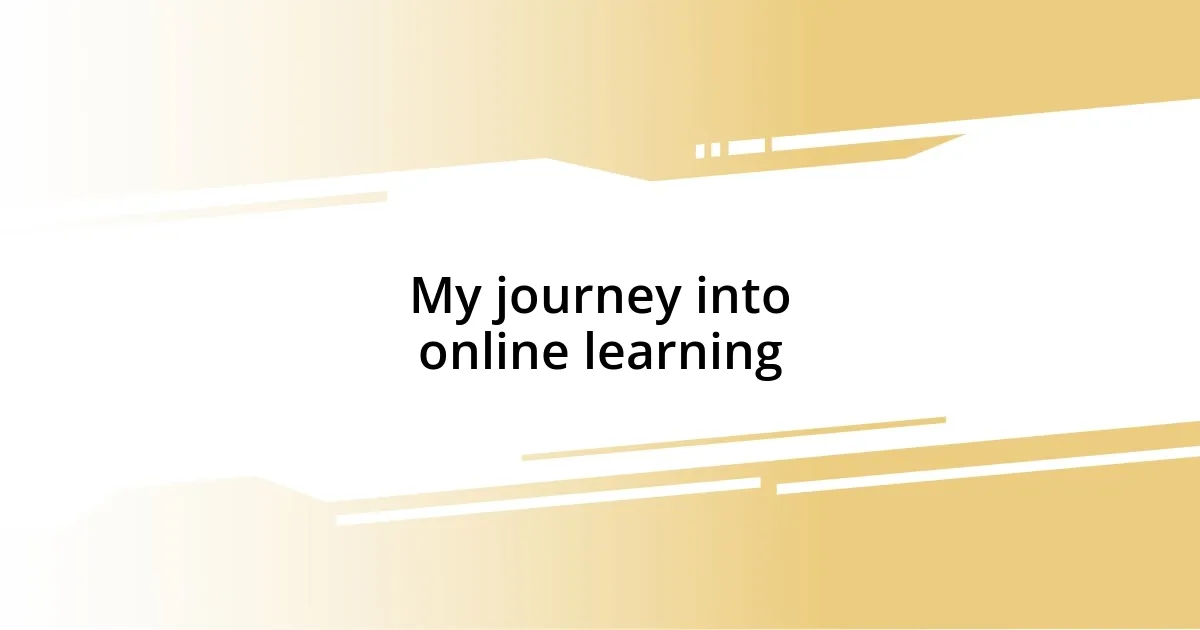
My journey into online learning
When I first dipped my toes into online learning, I was both excited and nervous. I remember staring at my computer screen, wondering if I would find the discipline to finish a course all on my own. How would I stay motivated without a classroom atmosphere?
My first course was an introduction to digital marketing, and honestly, I wasn’t sure what to expect. As the lectures rolled out, I found myself captivated by the content but irritated with my distractions at home. I’d often catch myself scrolling through social media instead of taking notes. It was a real challenge to train my brain to focus without the structure of a traditional classroom.
As the weeks went by, I started to develop my own routine—designating a specific area in my home as my study zone. I can still recall the satisfaction I felt when I finally finished my first assignment. It was more than just completing a task; it felt like a personal victory. Have any of you experienced that rush of accomplishment from an online course? That’s when I realized, despite its challenges, online learning could offer me a sense of independence that I hadn’t fully appreciated before.
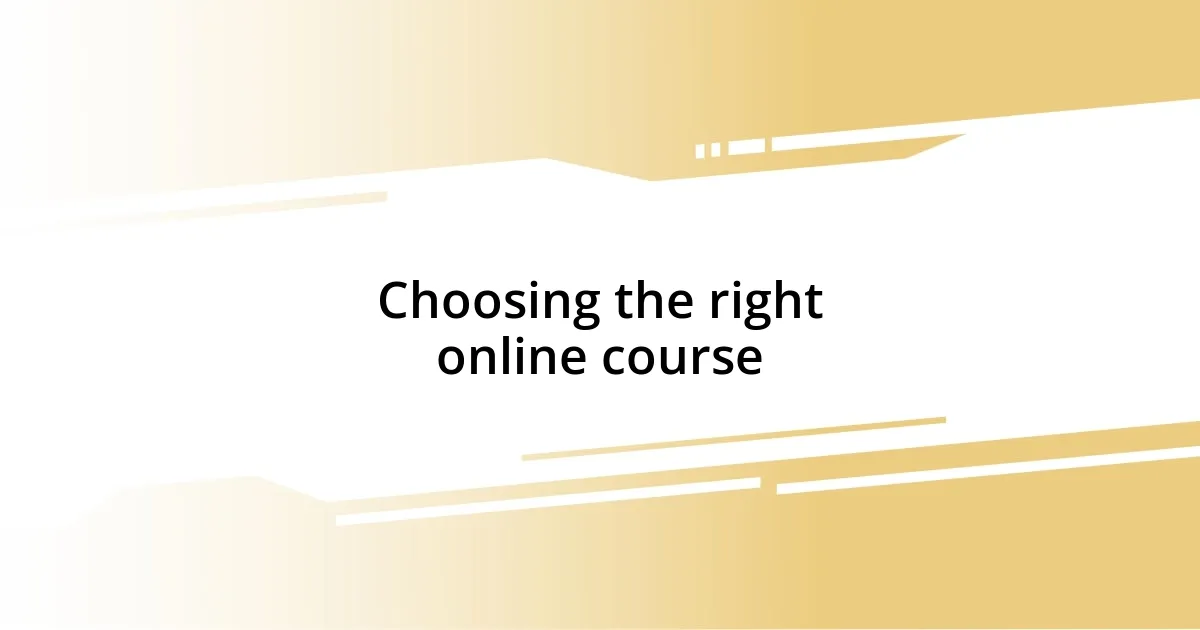
Choosing the right online course
Choosing the right online course can feel overwhelming, especially with so many options available today. When I started looking, I remember scrolling through countless course listings, each with catchy titles and promises of expertise. It’s easy to get swept up in the excitement, but I learned to pause and think critically about what I genuinely wanted to gain. My first step was to define my goals—was I interested in enhancing my current skills, or was I exploring something completely new?
Here are some key factors to consider when choosing the right course:
- Reputation: Research the course provider. Look for reviews and testimonials from previous students.
- Curriculum: Make sure the syllabus aligns with your interests and learning objectives. I once overlooked this and ended up in a course that was much broader than I anticipated.
- Instructor Expertise: Check the instructor’s background and experience. Having a knowledgeable guide can make a significant difference in your learning experience.
- Flexibility: Consider your schedule. Online courses vary in terms of deadlines, and I found that flexibility was crucial for my busy lifestyle.
- Support Resources: Look for courses that offer additional resources such as forums, Q&A sessions, or mentorship. I sometimes found myself longing for additional support when I was stuck on a difficult topic.
Trust me, taking the time to choose thoughtfully can really enhance your online learning journey.
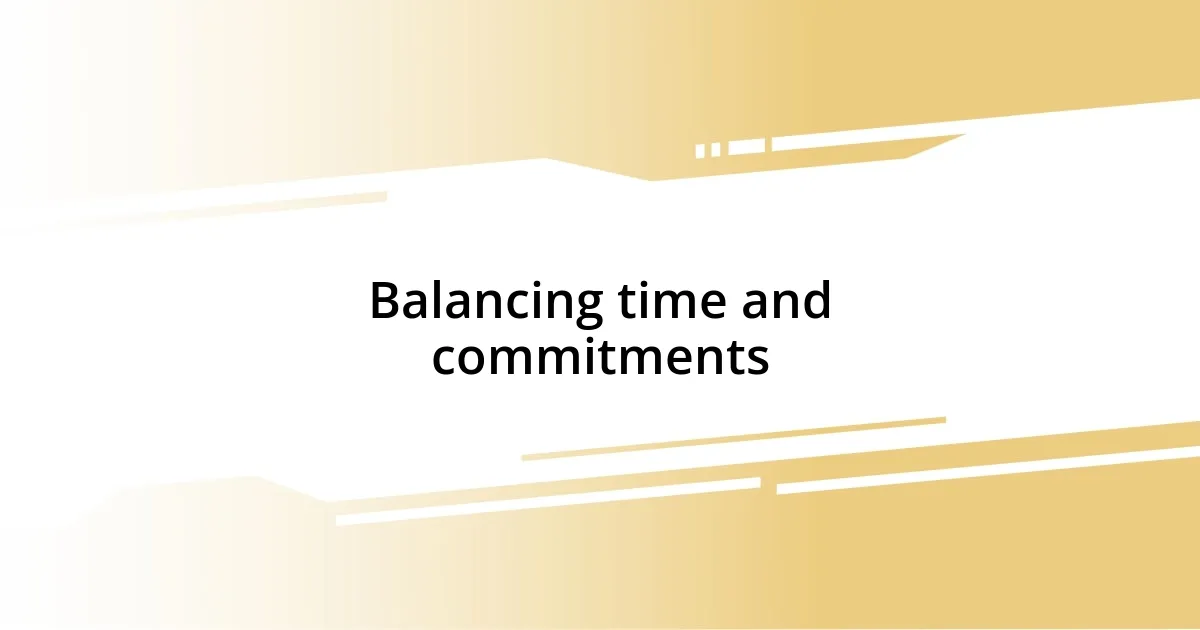
Balancing time and commitments
Balancing my time commitments while pursuing online courses was one of the most significant hurdles I faced. I vividly recall the feeling of being pulled in various directions—work obligations, family responsibilities, and personal interests all vying for my attention. I decided to create a visual schedule on my fridge. Seeing everything laid out helped me stay accountable and prioritize my study sessions. This approach felt almost like taking control of my life again.
Over time, I started to recognize the importance of setting boundaries. In the beginning, I struggled with saying “no” to social outings or even family activities. However, I learned that it was essential to carve out dedicated periods for studying; it was more about quality than quantity. When I finally communicated my needs to my loved ones, they were surprisingly supportive.
As I balanced these competing responsibilities, I stumbled upon a technique called the Pomodoro Technique—a method where you break your work into intervals, typically 25 minutes, followed by a short break. This method not only helped me maintain focus but also ensured I wasn’t overwhelmed. It felt rewarding to check off tasks on my to-do list and squeeze in those well-deserved breaks without guilt.
| Weekday Schedule | Weekend Schedule |
|---|---|
| Mornings | Mornings |
| Work obligations | Online course revision |
| Lunch break | Family time |
| Afternoon | Afternoon |
| Online course study | Outdoor activities |
| Evenings | Evenings |
| Exercise | Free time/relax |
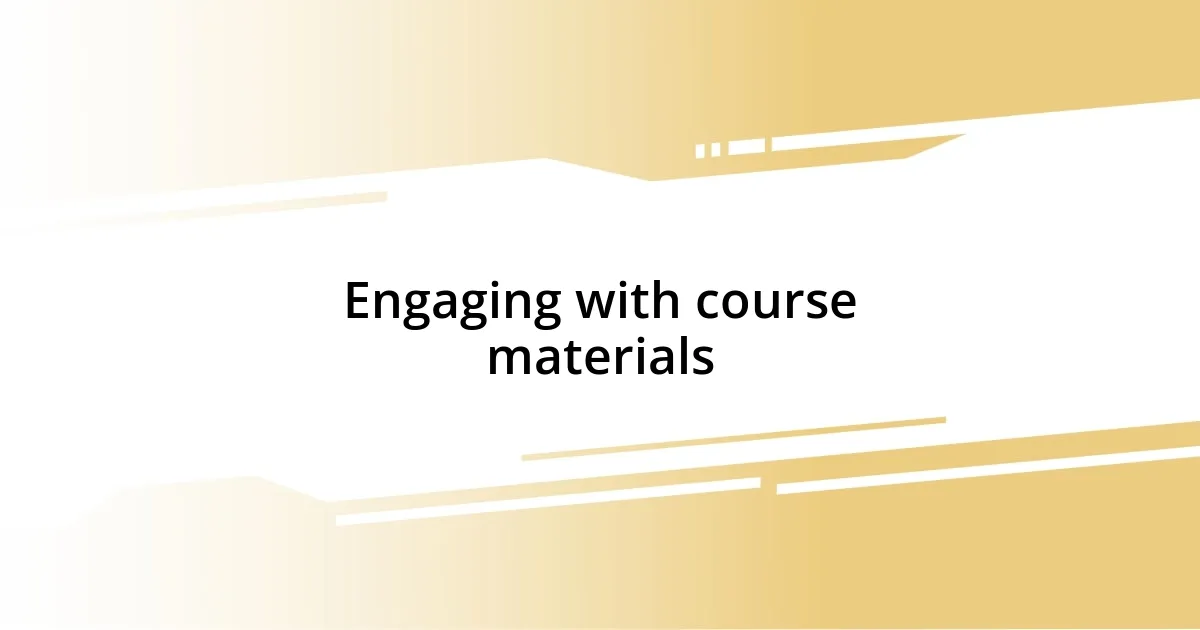
Engaging with course materials
Engaging with course materials can be a game changer in enhancing the learning experience. There were days when a lecture video left me feeling inspired, yet at other times, I struggled to maintain my focus. I found that interacting actively with the materials, like taking notes or discussing concepts with fellow learners, transformed my understanding. Have you ever felt that spark of connection when you truly delved deep into a topic? I remember discussing a particularly challenging subject with classmates and suddenly everything clicked into place.
One technique I adopted was to create mind maps while reviewing new concepts. This visual approach not only made the material more memorable but also sparked my creativity. I often colored and doodled within my notes, which made studying feel less like a chore and more like a fun project. By engaging with the course content in a way that connected with my learning style, I stayed motivated. Have you ever realized how much a hands-on approach can enhance retention of information? It made a notable difference for me.
Another pivotal moment came when I began to participate in online forums related to my courses. Sharing my thoughts and asking questions in these spaces opened up new dimensions of learning. I didn’t just absorb information—it became a dialogue. It felt empowering and reinforced my understanding to see how others viewed the same materials. Engaging with course content isn’t just about consuming—it’s about conversing, questioning, and connecting. Have you found any strategies that bring those materials to life for you?
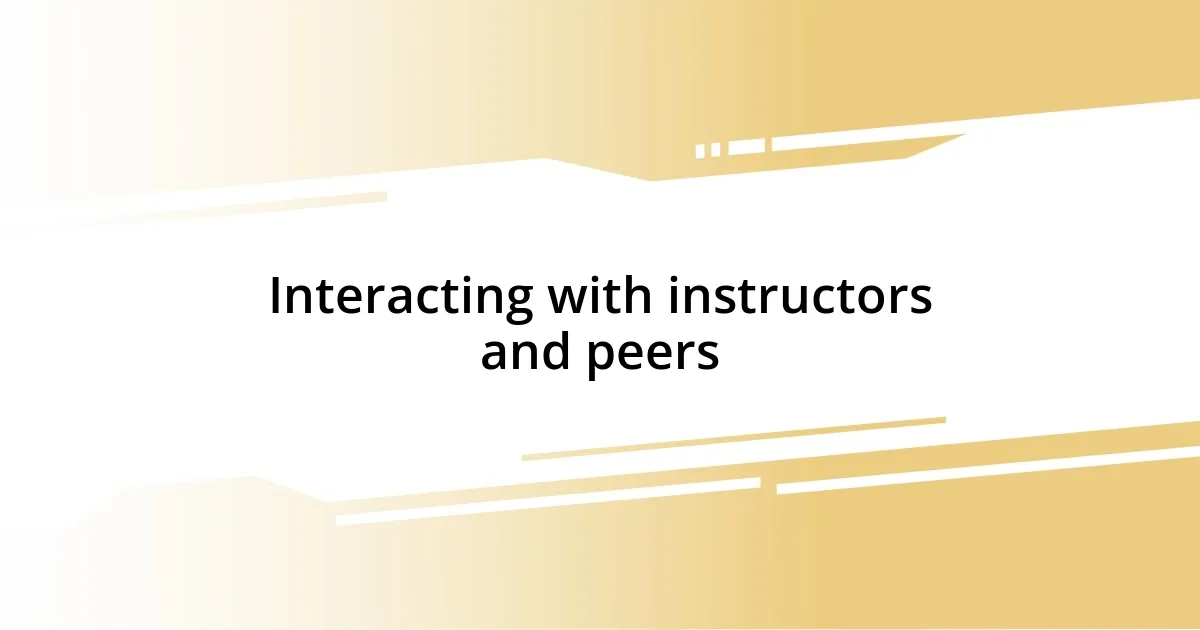
Interacting with instructors and peers
Interacting with instructors and peers has been a pivotal aspect of my online course experience. I distinctly remember a time when I had a burning question about a challenging assignment. Instead of hesitating, I reached out to my instructor via our course platform. Their prompt and insightful response not only cleared my confusion but also fostered a sense of connection. Have you ever experienced the relief of having a mentor guide you through a tough spot? I realized that building relationships with instructors can truly enhance the online learning experience.
The value of peer interactions cannot be overstated. One evening, I joined a virtual study group that gathered weekly to discuss course topics. Initially, I was unsure what to expect, but the discussions quickly sparked lively exchanges of ideas. It often felt like a mini classroom, where we could bounce concepts off one another. These sessions not only deepened my understanding but also forged friendships that gave me added motivation. Isn’t it fascinating how sharing knowledge with others can create a community even from afar?
I’ve learned that engaging in discussions with classmates goes beyond mere collaboration; it opens avenues for diverse perspectives. I recall a debate over a course-related article that left me challenged yet invigorated at the same time. Participating in these dynamic conversations often led to new insights and even changed my views on certain subjects. Have you ever found that a single conversation can shift your perspective in unexpected ways? I now see these interactions as an invaluable element of online learning, making the journey not just about acquiring knowledge but also about building a vibrant learning community.
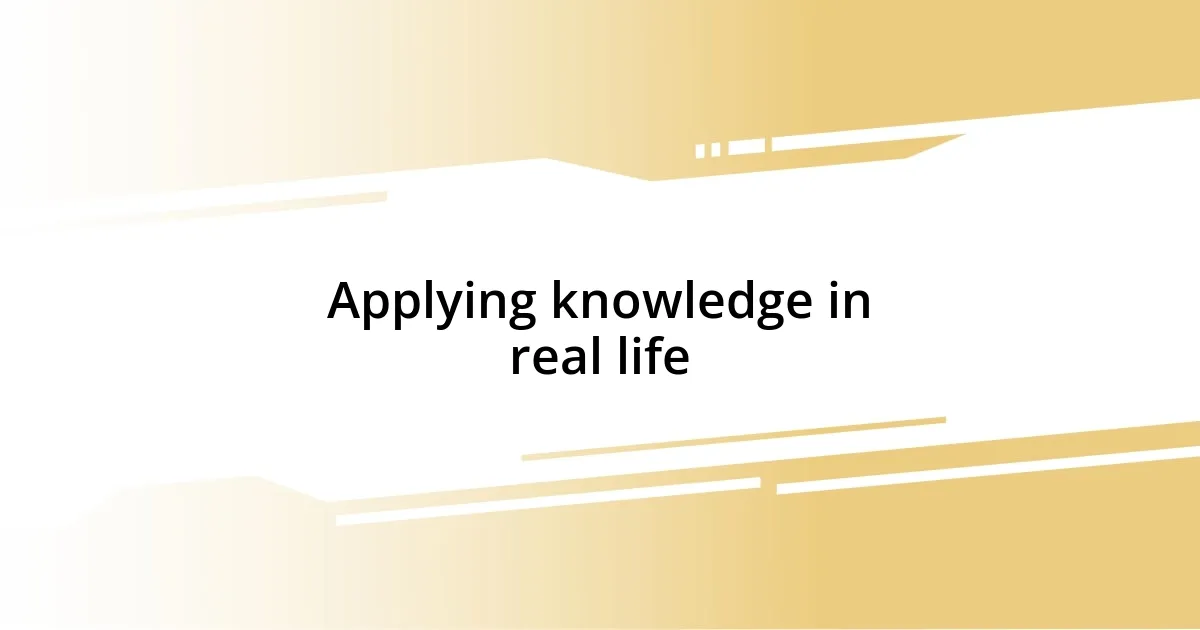
Applying knowledge in real life
Applying what I’ve learned in real life has been a transformative experience. I vividly remember the first time I implemented a project management technique from an online course. I was overwhelmed with a group project at work, and instead of panicking, I applied the concepts of prioritization and task delegation I had learned. The result? We completed the project ahead of schedule, and I felt an exhilarating sense of accomplishment. Have you ever used something you learned to solve a real-life problem? It adds a whole new layer of satisfaction to the learning process.
Utilizing knowledge from online classes in day-to-day situations goes beyond just work projects; it seeps into personal life as well. When I took a course on nutrition, I started making healthier meal choices right away. At first, it felt intimidating, but as I dived into meal prep, I realized how empowering it was to take control of my health. Have you ever discovered that applying your learning can boost your confidence? I felt that surge of energy every time I tried a new recipe or shared insights with friends.
The beauty of online education lies in its applicability. For instance, a marketing strategy I learned became crucial when I began promoting my small side business. I remember analyzing my target audience based on the principles I had just studied, and it transformed my approach. Watching engagement go up as more people connected with my content was thrilling. Have you experienced that moment when something you’ve learned clicks perfectly with your endeavor? It’s those practical applications that make education feel truly worthwhile.



